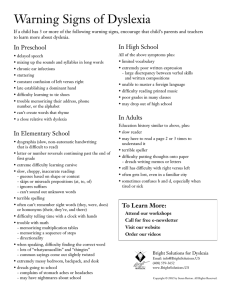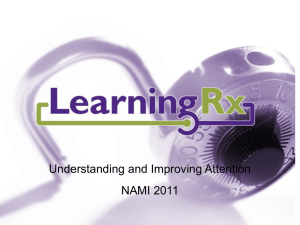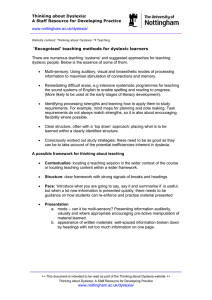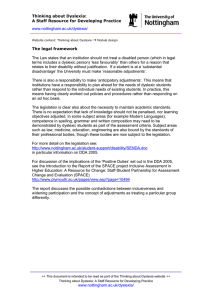to view frequently Asked Questions by parents/carers about Dyslexia
advertisement
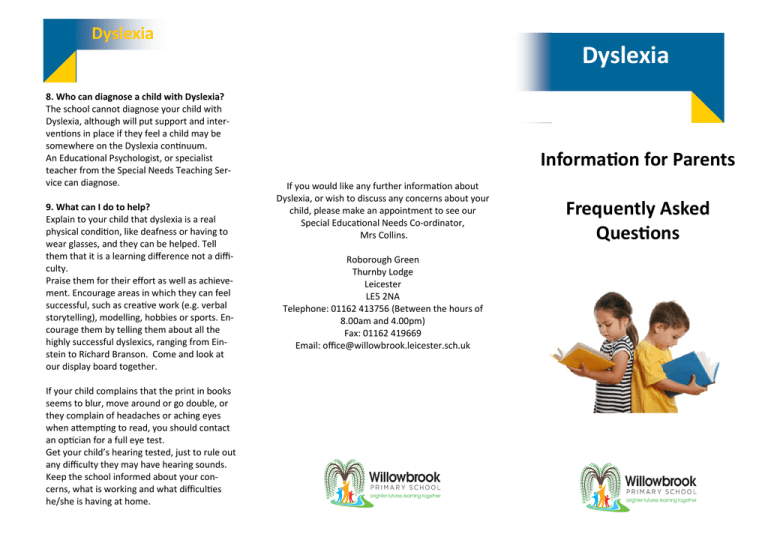
Dyslexia Dyslexia 8. Who can diagnose a child with Dyslexia? The school cannot diagnose your child with Dyslexia, although will put support and intervenons in place if they feel a child may be somewhere on the Dyslexia connuum. An Educaonal Psychologist, or specialist teacher from the Special Needs Teaching Service can diagnose. 9. What can I do to help? Explain to your child that dyslexia is a real physical condion, like deafness or having to wear glasses, and they can be helped. Tell them that it is a learning difference not a difficulty. Praise them for their effort as well as achievement. Encourage areas in which they can feel successful, such as creave work (e.g. verbal storytelling), modelling, hobbies or sports. Encourage them by telling them about all the highly successful dyslexics, ranging from Einstein to Richard Branson. Come and look at our display board together. If your child complains that the print in books seems to blur, move around or go double, or they complain of headaches or aching eyes when a,empng to read, you should contact an opcian for a full eye test. Get your child’s hearing tested, just to rule out any difficulty they may have hearing sounds. Keep the school informed about your concerns, what is working and what difficules he/she is having at home. Informaon for Parents If you would like any further informaon about Dyslexia, or wish to discuss any concerns about your child, please make an appointment to see our Special Educaonal Needs Co-ordinator, Mrs Collins. Roborough Green Thurnby Lodge Leicester LE5 2NA Telephone: 01162 413756 (Between the hours of 8.00am and 4.00pm) Fax: 01162 419669 Email: office@willowbrook.leicester.sch.uk Frequently Asked Quesons Dyslexia Dyslexia 1.What is Dyslexia? Dyslexia is a learning difficulty that affects the skills involved in accurate and fluent word reading and spelling. Dyslexia occurs across the full range of intellectual abilies. It is best thought of as a connuum, not a disnct category, and there are no clear cut-off points. Mild Severe Somemes people with Dyslexia have other difficules such as; understanding of language, co-ordinaon, mental calculaon, concentraon and personal organisaon, but these are not, by themselves, markers of dyslexia. A good way to assess dyslexic difficules is to see a child response to intervenons and well planned support given at school. 2. How common is Dyslexia? About 10% of the populaon are affected by dyslexia to some degree. Remember though it is a connuum, so some people may be affected mildly but others more severe. So in a class of 30 children there may be 3 or 4 children with some level of Dyslexia. 3. What are ‘Specific Learning Difficules? Dyslexia is a specific learning difficulty. It is a term used to describe difficules when other areas of learning are not a problem. For example, a child might have a specific difficulty with reading and wring but may be very good at speaking and listening and Maths. 4. Is Dyslexia hereditary? Dyslexia does tend to run in families; it is known that there are several genes that contribute to a genec risk of dyslexia. Brain scanning studies suggest that, in dyslexic people, the connecons between different language areas of the brain do not work as efficiently as they should. However, these differences are not linked to intelligence, and there is evidence that many dyslexic people have strengths and abilies in tasks that involve creave and visuallybased thinking. 5. Can my child sll do well even though they have Dyslexia? Dyslexia need not be a barrier to achievement and success! Come and see our display in the recepon area. It is full of people who have Dyslexia and are highly successful! Dyslexia 6. What should I do if I think my child has Dyslexia? h,p://www.bdadyslexia.org.uk Leicestershire Dyslexia Associaon. General Enquiries: 01509 213 262 E-mail: roshenshaw@hotmail.com Web: h,p://www.lda-dyslexia.org.uk Area: Leicester City & Leicestershire. All LE postcodes. There is lots of informaon available for parents. Check out the websites and local support group above. Also look at the other Dyslexia resources on our school website. Speak to your child’s class teacher and/or the school’s SENCO. Mrs Collins is available at the beginning and end of most days, or make an appointment at the office. 7. What will happen then? As part of the assessment process informaon will be gathered on the areas of concern. The teacher will complete a form that gives a full picture of the difficules and areas of strength of the child. Appropriate intervenons will be put in place if your child needs it. Further assessment work may be carried out by the SENCO. Progress will be tracked very closely and, if difficules persist, the school may refer to the Special Needs Teaching Service for further advice and support.


